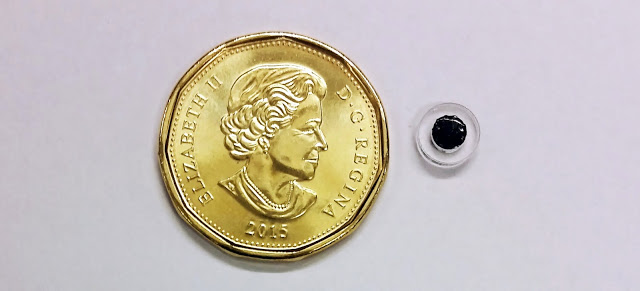

| Online: | |
| Visits: | |
| Stories: |

| Story Views | |
| Now: | |
| Last Hour: | |
| Last 24 Hours: | |
| Total: | |
Magnet Triggers Drug Release from Implant
The device, a silicone sponge with magnetic carbonyl iron particles wrapped in a round polymer layer, measures just six millimetres in diameter. The drug is injected into the device and then surgically implanted in the area being treated. Passing a magnet over the patient’s skin activates the device by deforming the sponge and triggering the release of the drug into surrounding tissue through a tiny opening.
Size of the magnetic implant compared to the Canadian one-dollar coin. 
Actively controlling drug delivery is particularly relevant for conditions like diabetes, where the required dose and timing of insulin varies from patient to patient, said co-author John K. Jackson, a research scientist in UBC’s faculty of pharmaceutical sciences.
“This device lets you release the actual dose that the patient needs when they need it, and it’s sufficiently easy to use that patients could administer their own medication one day without having to go to a hospital,” said Jackson.
The researchers tested their device on animal tissue in the lab using the prostate cancer drug docetaxel. They found that it was able to deliver the drug on demand even after repeated use. The drug also produced an effect on cancer cells comparable to that of freshly administered docetaxel, proving that drugs stored in the device stay effective.
Mu Chiao, Shademani’s supervisor and a professor of mechanical engineering at UBC, said the team is working on refining the device and narrowing down the conditions for its use.
“This could one day be used for administering painkillers, hormones, chemotherapy drugs and other treatments for a wide range of health conditions. In the next few years we hope to be able to test it for long-term use and for viability in living models,” said Chiao.
Contacts and sources:
Lou Corpuz-Bosshart
University of British Columbia
Citation: “Active regulation of on-demand drug delivery by magnetically triggerable microspouters” was recently published online in the journal Advanced Functional Materials. Click here to download a copy.
Source:


